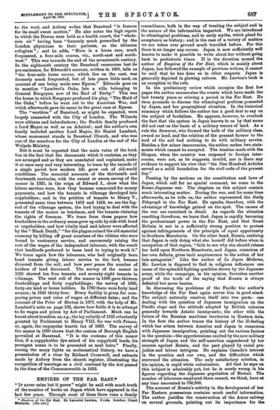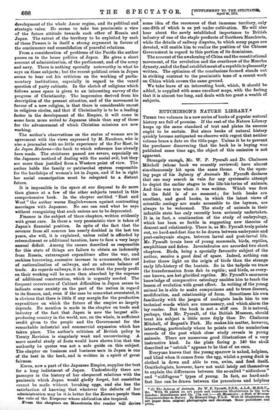EMPIRES OF THE FAR EAST" "IT never rains but it
pours" might be said with much truth of the number of books on Japan which have appeared in the last few years. Through most of them there runs a family
• Empires of the Far East. By Lancelot Lawton. 2 vols. London; Grant Richards. [30s. net.1
resemblance, both in the way of treating the subject and in the nature of the information imparted. We are introduced to ethnological problems, and to early myths, which plead for acceptance as history; and in the case of a variety of matters we are taken over ground much travelled before. For this there is no longer any excuse. Japan is now sufficiently well known to make it possible to write about her without going back to prehistoric times. If in the direction named the author of Empires of the Far East, which is mainly about Japan, has followed the example of previous writers, it cannot be said that he has done so in other respects. Japan is generally depicted in glowing colours. Mr. Lawton's book is an exception to the rule.
In the preliminary review which occupies the first few pages the author enumerates the events which have made the last twenty years so stirring a period in the Far East. He then proceeds to discuss the ethnological problem presented by Japan, and her geographical situation. In the historical summary which follows the author has a good deal to say on the subject of feudalism. He appears, however, to overlook the fact that the system in Japan known to us by that name did not rest on the basis of a military tenure of land. As a rule the Samurai, who formed the bulk of the military class, owned no land, and the relation of the peasant farmer to the lord of the soil had nothing to do with military service. Besides a few minor inaccuracies, the author makes two state- ments which cannot be accepted. The treaties made with the Shogun, when the country was reopened to foreign inter- course, were not, as he suggests, invalid, nor is there any evidence to support his view that "the One Hundred Articles served as a solid foundation for the civil code of the present day."
Passing by the sections on the constitution and laws of Japan, which call for no special comment, we come to the Russo-Japanese war. The chapters on this subject contain much interesting matter. During the war, and for some time afterwards, as he tells us, the author represented the Daily Telegraph in the Far East. He speaks, therefore, with the advantage of knowledge gained on the spot. The causes of the war are examined in detail. As regards the situation resulting therefrom, we learn that Japan is rapidly becoming the predominant power in the Far East, and that Great Britain is not in a sufficiently strong position to protest against infringements of the principle of equal opportunity in Southern Manchuria. On the other hand, Russia, realizing that Japan is only doing what she herself did before when in occupation of that region, "fails to see why she should release her hold upon Northern Manchuria, and Japan, conscious of her own defects, gives tacit acquiescence to the action of her late antagonist." Like the author of Le Japan Moderne, Mr. Lawton is disposed to find in religious influences one cause of the splendid fighting qualities shown by the Japanese army, while the campaign, in his opinion, furnishes another proof of the truth of the saying that Russia is always defeated but never beaten.
In discussing the problems of the Pacific the author's knowledge of the Far East again serves him in good stead. The subject naturally resolves itself into two parts: one dealing with the question of Japanese immigration on the Pacific slope and the attitude adopted by British colonies generally towards Asiatic immigrants; the other with the future of the Russian maritime territories in Eastern Asia. In the first the author traces the history of the ill-feeling which has arisen between America and Japan in connexion with Japanese immigration, pointing out the various factors in the question—the apprehensions excited by the new military strength of Japan and the self-assertion engendered by her success against Russia, and the part played by racial pre- judice and labour intrigues. He explains Canada's interest in the question and our own, and the difficulties which surround the situation. The only satisfactory solution, in his opinion, is rapid white colonization. All that he says on this subject is admirably put, but he is surely wrong in his figures regarding the Japanese population of Hawaii. The number of labourers employed there cannot, we think, have at any time amounted to 700,000.
The account of Russia's activity in the development of her Far Eastern possessions contains much useful information. The author justifies the construction of the Amur railway on several grounds, pointing out its importance for the development of the whole Amur region, and its political and strategic value. He seems to take too pessimistic a view of the future attitude towards each other of Russia and Japan. The extent of the territory to be exploited by each of these Powers is in itself a strong argument in favour of the continuance and consolidation of peaceful relations.
From a consideration of problems of the Pacific the author passes on to the home politics of Japan. He gives a -short
account of administration, of the parliament, and of the army and navy. There is nothing specially noteworthy in what he says on these subjects ; but the recent political crisis in Japan seems to bear out his criticism on the working of parlia- mentary institutions, especially in regard to the vexed question of party cabinets. In the sketch of religions which follows some space is given to an interesting survey of the progress of Christianity. The impression derived from his description of the present situation, and of -the movement in favour of a new religion, is that there is considerable unrest in religious circles, and that if Christianity is to be a leading factor in the development of the Empire, it will come in some form more suited to Japanese ideals than any of those for the advancement of which Christian missions are now , working.
The author's observations on the status of woman are in agreement with the views expressed by M. Naudeau, who is also a journalist with no little experience of the Far East, in Le Japon Modertze—the book to which reference has already been made. The strictures passed are severe, especially on the Japanese method of dealing with the social evil, but they are more than justified from a Western point of view. The author holds the family or patriarchal system responsible for the hardships of woman's lot in Japan, and if he is right her social emancipation must be relegated to a distant future.
It is impossible in the space at our disposal to do more than glance at a few of the other subjects treated in this comprehensive book. In the chapter entitled "East and West" the author warns Englishwomen against contracting marriages with Japanese. No one can read what he says without recognizing that such unions are to be deprecated.
Finance is the subject of three chapters, written evidently with great care. In these a very pessimistic view is taken of Japan's financial position. In spite of the fact that the revenue from all sources has nearly doubled in the last ten years, she will, it is explained, unless relief is afforded by retrenchment or additional taxation, have to face a very large annual deficit. .Among the causes described as responsible for this state of things are failure to obtain an indemnity from Russia, extravagant expenditure after the war, and reckless borrowing, excessive increase in armaments, the cost of nationalization of railways, and an adverse balance of trade. As regards railways, it is shown that the yearly profit on their working will be more than absorbed by the expense of additional construction, which is urgently needed. The frequent occurrence of Cabinet difficulties in Japan seems to indicate some anxiety on the part of the nation in regard to its finance, and, even if the case be somewhat overstated, it is obvious that there is little if any margin for the productive expenditure on which the -future of the empire so largely depends. No mention is made in the chapter on trade and industry of the fact that Japan is now the largest silk- producing country in the world, nor, on the whole, is sufficient credit given to the people and the Government for the remarkable industrial and commercial expansion which has taken place. The author's criticism of British policy in Treaty Revision is singularly weak and unconvincing. A more careful study of facts would have shown him that the authority he quotes was not a safe guide on this subject. The chapter on business and business men in Japan is one of the beat in the book, and is written in a spirit of great fairness.
Korea, now a part of the Japanese Empire, supplies the-text for a long indictmextt of Japan. Undoubtedly there are passages in -the history of her chequered relations -with the peninsula which Japan would gladly forget, but omelettes cannot be made without breaking eggs, and she has the satisfaction of knowing that whatever the defects of her administration may be it is better for the Korean people than the rule of the Emperor whose abdication she inspired.
From the chapters an klanchusia the reader will derive some idea of the resources of that immense territory, only one-fifth of which is as yet under cultivation. Be will also hear about the newly established importance to British industry of one of the staple products of Southern Manchuria, while the details of railway disputes, to which many pages are devoted, will enable him to realize the position.of the Chinese GovernMent in regard to this portion of its dominions.
The account of the awakening of.China and the constitutional movement, of the revolution and the overthrow of the Manchu dynasty, and of the final establishment of a republic is pleasantly written. The optimism of the conclusions formed stands out in striking contrast to the pessimistic tone of a recent work on China which covers .the same ground.
We take leave of an interesting book, which, it should be added, is supplied with some excellent maps, with the feeling that it is almost too long, and deals with too great a -wealth of subjects.



























































 Previous page
Previous page